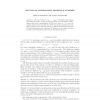Free Online Productivity Tools
i2Speak
i2Symbol
i2OCR
iTex2Img
iWeb2Print
iWeb2Shot
i2Type
iPdf2Split
iPdf2Merge
i2Bopomofo
i2Arabic
i2Style
i2Image
i2PDF
iLatex2Rtf
Sci2ools
107
click to vote
EJC
2011
2011
Bounds on generalized Frobenius numbers
Let N ≥ 2 and let 1 < a1 < · · · < aN be relatively prime integers. The Frobenius number of this N-tuple is defined to be the largest positive integer that has no representation as PN i=1 aixi where x1, ..., xN are nonnegative integers. More generally, the s-Frobenius number is defined to be the largest positive integer that has precisely s distinct representations like this. We use techniques from the Geometry of Numbers to give upper and lower bounds on the s-Frobenius number for any nonnegative integer s.
EJC 2011 | Information Technology | Largest Positive Integer | Nonnegative Integer | S-Frobenius Number |
Related Content
| Added | 14 May 2011 |
| Updated | 14 May 2011 |
| Type | Journal |
| Year | 2011 |
| Where | EJC |
| Authors | Lenny Fukshansky, Achill Schürmann |
Comments (0)

